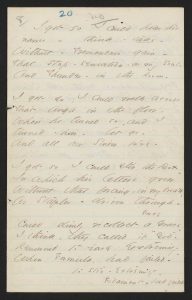I got so I could hear his
name –
Without – Tremendous gain –
That Stop-sensation – on my Soul –
And Thunder – in the Room –
I got so I could walk across
That Angle in the floor,
Where he turned so, and I
turned – how – (let go -)
And all our Sinew tore –
I got so I could stir the Box –
In which his letters grew
Without that forcing, in my breath –
As Staples – driven through –
Could dimly recollect a Grace – (Force)
I think, they called it “God” –
Renowned to ease Extremity – (to stir – Extremity -)
When Formula, had failed – (Filament – had failed -)
And shape my Hands –
Petition’s way,
Tho’ ignorant of a word
That Ordination – utters –
My Business – with the Cloud,
If any Power behind it, be,
Not subject to Despair – (Supremer than – • Superior to -)
It care – in some remoter way,
For so minute affair
As Misery –
Itself, too great (vast), for interrup – (interrupting)
ting – more –
Link to EDA manuscript. Originally in Packet XX, Fascicle 10, ca. 1861. First published in London Mercury, 19 (February 1929), 357; New York Herald Tribune Books (10 March 1929), 4, and Further Poems (1929), 183-84. Courtesy of Houghton Library, Harvard University, Cambridge, Mass.
This poem appears after “Faith is a fine invention” (F202A, J185), with its skepticism about religious faith in relation to the modern science of “Microscopes,” and before “A Single Screw of Flesh,” which is the next poem discussed. It darkens the mood from the euphoria of “I taste a liquor never brewed” and the wry tone of “Faith is a fine invention.” Read alone, this poem is often interpreted as the end of a love affair–the meeting in a room, the letters accumulating in a box. In the context of the fascicle, the emphasis falls on the aftermath of a traumatic event, and the subsequent loss of faith, of surviving the blow and living with it.
The struggle takes on physical dimensions and a rather specific location, “That Angle in the floor, /Where he turned so, and I/ turned – how/ and all our Sinew tore –.” “Turning” in religious terms usually means a turning towards God, the first step in the conversion process. Here is seems to mean the opposite, turning away from faith. The word “Sinew” brings us into the Biblical story of Jacob wresting with the Angel from Genesis 32:22-31, who is injured in his thigh but prevails and gets a blessing. This word also appears in “I Rose – because he sank” in last week’s post. The speaker here can barely remember “Grace” and “God,” can barely shape her hands to pray.
Sharon Cameron reads the poem as an example of “knowledge that dares not scrutinize itself” and “narrative breakdown.” She argues that the point of too much pain produces “rhythmic transformations in the last three stanzas: full rhyme disappears, the common particular meter established in the first three stanzas gives way to variation, as does the regular four-stress line. Such rhythmic change also counterpoints the paraphrasable sense of the lines.” Finally, she says, the poem, “though not, I suspect, intentionally, is about what it is like to trivialize feeling because, as is, feeling has become unendurable. Better to make it nothing than to die from it.”


